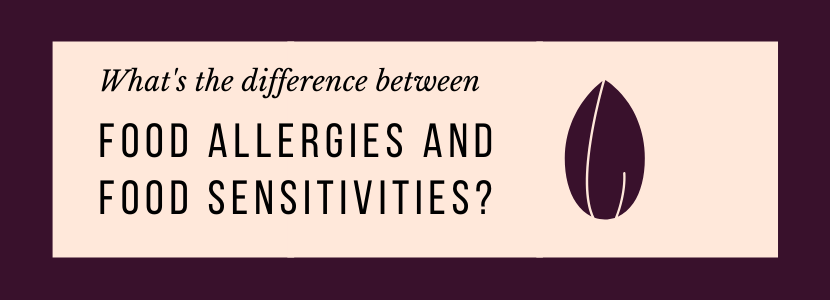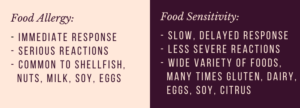
Do you ever remember a time where there has been as many food intolerances as there are today?
Whether it’s packing nut-free snacks for your kids, making a gluten-free dinner for your spouse, or steering clear of dairy for yourself, food aversions seem to be everywhere, leaving many of us to wonder…
Do I have an allergy to a certain food? Or is it a sensitivity? And if so, what’s the difference and how do I know?
Due to the critical connection of food and our health, we want to break down these questions and make it easier to understand the world of food allergies and sensitivities.
Food Allergies
One of the most important things to know about food allergies is that they are fast-acting and have a more immediate response than a sensitivity – and they can be serious.
A food allergy is an allergic response from the immune cell IgE in which uncomfortable and sometimes very dangerous reactions can occur such as:
– hives
– rashes
– swelling
– stomach pain
– anaphylactic shock
Commonly, kids and adults are susceptible to these allergic responses from foods such as, but not limited to:
– wheat
– peanuts
– tree nuts
– shellfish
– milk
– eggs
– soy
– strawberries
And if it seems that food allergies are rapidly rising, you are correct. Due to the overuse of antibiotics as well as our increase in cleanliness, our immune systems are not provided the opportunity to learn to fight appropriately. Instead of attacking parasite proteins, our immune systems are beginning to attack food proteins – leading to food allergies.
Food Sensitivities
Food sensitivities, although still an immune intolerance, are different from food allergies.
A different immune system cell (the IgG cell not the IgE cell) reacts to food sensitivities. This cell produces responses that are:
– slower
– delayed
– less severe
– less intense
than a food allergy. Reactions are usually experienced anywhere from 30 minutes to 48 hours after a food has been ingested.
What does this mean?
It can be very difficult to tell if you have a food sensitivity – and if you do, which food it is. You may experience a variety of symptoms that you may not immediately link to food, but in the end, is the root cause.
This intolerance can lead to symptoms such as:
– inflammation
– weight gain
– stomach upset or nausea
– celiac disease
– heartburn
– diarrhea or constipation
– headaches
– skin conditions
– mood or behavioral issues
– sinus issues
and other illnesses and conditions.
There are many different foods that our bodies may be intolerant to, some of the most common being:
– dairy/lactose
– gluten
– eggs
– soy
– citrus
– additives
How to Know if You Have a Food Intolerance
If you are experiencing any unusual symptoms, you may want to consider food as a culprit.
This can be discovered in a few different ways:
- Food Sensitivity Testing
Many western doctors do not test for sensitivities, only for allergies. This blood test, which can be prescribed at the CNMA office, tests 96 foods and the majority of the test has proven to be accurate for our clients. It is typically not covered by insurance and usually runs between $250-$275.
- Elimination Diet.
If food sensitivity testing is not a viable option for you, the gold standard in food sensitivity discovery is the elimination challenge. It can be a long, but beneficial process.
Start by cleaning up your diet by eating only the following for 3 weeks:
– lean meat/fish
– vegetables
– limited grains, rice
– basic and limited fruit
If you begin to feel better, then food may be a root cause of your symptoms. To find out which food(s) you may be sensitive to, slowly introduce one food back into your diet every 2-3 days. Pay close attention to any symptoms that arise by keeping a food journal.
Remember, food allergies and sensitivities are not the same. Different immune cells are involved leading to different reactions.

Do you think you are suffering from a food allergy or sensitivity and would like to know more about it?
If you live in Castle Rock, Castle Pines, Lone Tree, Highlands Ranch, Centennial, Parker, Larkspur, Monument, Colorado Springs, or the Greater Denver Metro area and would like to be tested or provided more insight on these common conditions, please call our office at (303) 688-6698 or click here to schedule a free 15 minute phone consultation with Dr. Graves.
Food is an integral part of our lives. Make sure it is one that is working for you – not against you.
REFERENCES:
https://my.clevelandclinic.org/health/diseases/10009-food-problems-is-it-an-allergy-or-intolerance

Leave a Reply